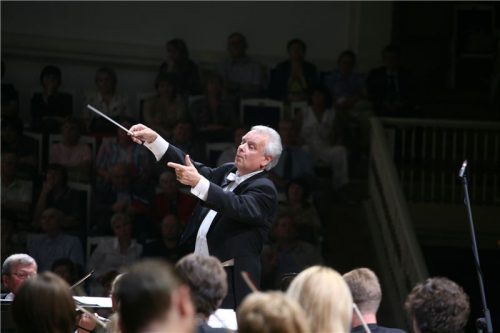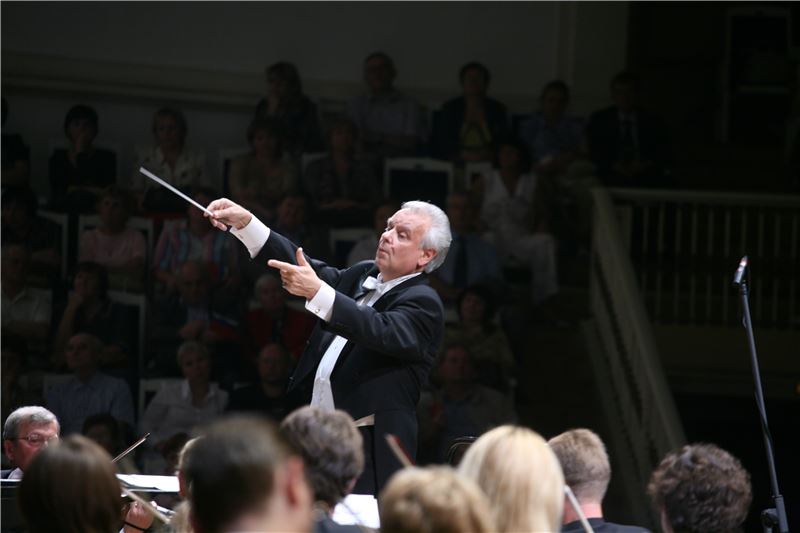 United Kingdom Tchaikovsky, Rachmaninov, Shostakovich: Alexandra Dariescu (soloist), Moscow Philharmonic /Yuri Simonov (conductor). Usher Hall, Edinburgh, 13.10.2019. (GT)
United Kingdom Tchaikovsky, Rachmaninov, Shostakovich: Alexandra Dariescu (soloist), Moscow Philharmonic /Yuri Simonov (conductor). Usher Hall, Edinburgh, 13.10.2019. (GT)

Tchaikovsky – Romeo and Juliet Fantasy Overture
Rachmaninov – Piano Concerto No.2 in C minor, Op.18
Shostakovich – Symphony No.10 in E minor, Op.93
It was Kirill Kondrashin who was the Moscow Philharmonic chief conductor and his great interpretations of Shostakovich and Mahler established their reputation. Yuri Simonov has been their current Music Director for twenty-one years and is one of the great Russian conductors – the youngest to be chief of the Bolshoi Theatre. Mravinsky was his mentor and Simonov trains his musicians in the manner of his teacher with a degree of discipline and strict adherence to the composer’s work. Yet surprisingly, he has never enjoyed the brilliantly successful careers of Gergiev or Temirkanov in the West.
The Romeo and Juliet Fantasy Overture opened marvellously quietly, if not tentatively, and one was immediately impressed by the velvety and articulate strings, and slowly but surely, there was a superb building of passion in the music making, Simonov’s supremely precise stick work was noticeable. The brass group, especially the trumpets, were tremendous in their unison chords throughout the twenty-five minutes (which flew by). This proved the best performance of this ever popular piece that I have had the pleasure of listening to; Simonov treated it as a genuinely serious work rather than a pot-boiler for the concert programme.
Alexandra Dariescu was portrayed prominently on the programme cover and I must confess that I have never seen her play, nor heard of her, however on this hearing she is certainly a musician to look out for. Romania has a great heritage in producing superb musicians from Enesco, Celibidache to Lipatti and Lupu. She is tall with long black hair and her manner reminds one of Valentina Lisitsa who played here last season, however the Romanian pianist has a different style from the Ukrainian. Dariescu’s precisely articulated finger work pays great attention to legato and she made one forget past performances of Rachmaninov’s Second Piano Concerto by her fashioning of the great romantic chords of the masterpiece. Her entry with the thundering opening chords were masterful, and throughout the extensive first movement, she was finely supported by the Moscow Philharmonic’s strings, and I noted particularly the solo trumpet of Yaroslav Egorov. Another standout – in the slow movement – was the wonderful flute playing by Sergey Tumilov. Dariescu showed outstanding technique and musicality, yet she lacks that pearly brilliance of her compatriots who have dazzled the music world, but she shows great promise, and she has a busy schedule of concerts worldwide.
One wonders if anybody from the Edinburgh International Festival office was in attendance because it was already apparent that the level of playing in the first half was equal – if not on a higher level – than that of any of the orchestras that I heard during it this summer. It is many years since the Moscow Philharmonic played at the Festival, perhaps that could be sorted sometime soon. Based on this concert, the hall will be full.
The standards of playing were more than confirmed in the performance of perhaps the finest symphony written by Shostakovich – the Tenth. Simonov ensured a chilling atmosphere in the opening bars as the kernel of the idea was introduced by the low strings, the degree of great thinking, evoked somewhat Bachian gravitas. There were some particularly soulful sounds from the clarinets, and again the flute, with superbly precise brass playing and the percussion introduced a terrifically powerful passage. Then towards the close of this prolonged movement an image of almost heavenly bliss was heard on the piccolo of Elena Evtukhova. The brief scherzo was terrifically powerful in an exciting tour de force, with every section of the orchestra producing the most thrilling music, never too loud or brash, this seemed to be exactly as the composer would have wished. In the slow movement, the sense of mystery returned, with a most captivating idea heard repeatedly on the solo horn by Viktor Shefer – accompanied by different ensembles in the orchestra – the repeated horn calls produced at times a sense of calm solitude, and also a sense of contentment which was interrupted by the march taking us to quite a different world.
The finale was initially grave, and a passage on the oboe of Alexander Abashkin was played masterly, then suddenly Simonov switched the tempo, and a sense of dramatic urgency ensued with the flute and piccolo offering a sense of optimism, backed by the strings, and ultimately the orchestra culminated in an enthusiastic and triumphant close. This was a splendid concert fit for any major arts festival and a superb opening to the capital’s symphonic series at Usher Hall.
Gregor Tassie
For more about Usher Hall’s Sunday Classics click here.
